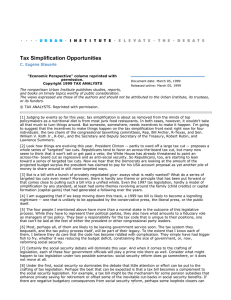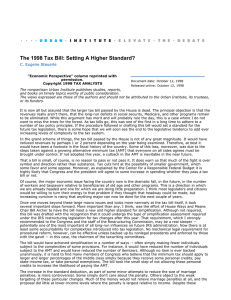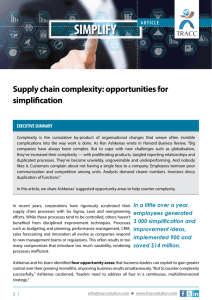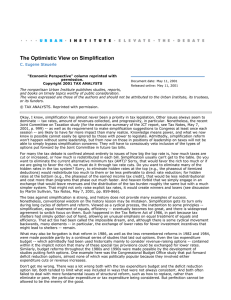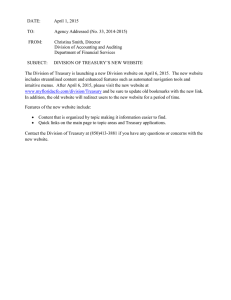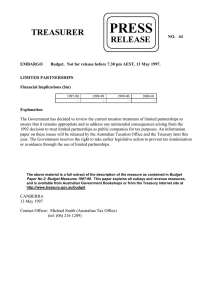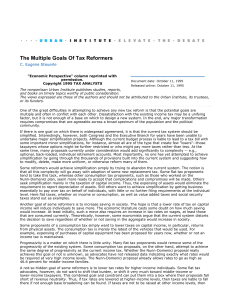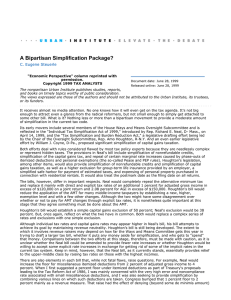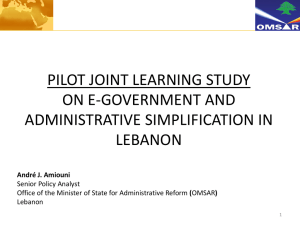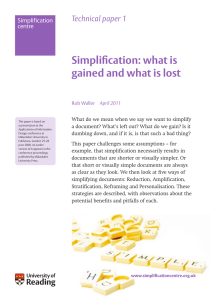Tax Simplification Through Process Reform C. Eugene Steuerle
advertisement
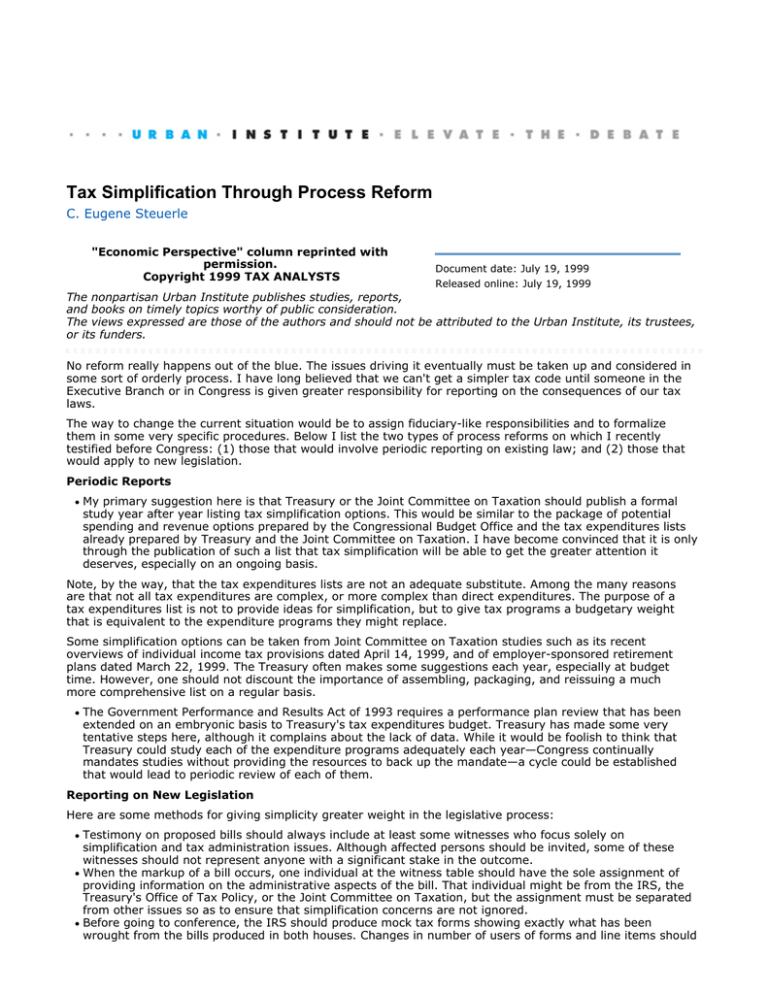
Tax Simplification Through Process Reform C. Eugene Steuerle "Economic Perspective" column reprinted with permission. Copyright 1999 TAX ANALYSTS Document date: July 19, 1999 Released online: July 19, 1999 The nonpartisan Urban Institute publishes studies, reports, and books on timely topics worthy of public consideration. The views expressed are those of the authors and should not be attributed to the Urban Institute, its trustees, or its funders. No reform really happens out of the blue. The issues driving it eventually must be taken up and considered in some sort of orderly process. I have long believed that we can't get a simpler tax code until someone in the Executive Branch or in Congress is given greater responsibility for reporting on the consequences of our tax laws. The way to change the current situation would be to assign fiduciary-like responsibilities and to formalize them in some very specific procedures. Below I list the two types of process reforms on which I recently testified before Congress: (1) those that would involve periodic reporting on existing law; and (2) those that would apply to new legislation. Periodic Reports My primary suggestion here is that Treasury or the Joint Committee on Taxation should publish a formal study year after year listing tax simplification options. This would be similar to the package of potential spending and revenue options prepared by the Congressional Budget Office and the tax expenditures lists already prepared by Treasury and the Joint Committee on Taxation. I have become convinced that it is only through the publication of such a list that tax simplification will be able to get the greater attention it deserves, especially on an ongoing basis. Note, by the way, that the tax expenditures lists are not an adequate substitute. Among the many reasons are that not all tax expenditures are complex, or more complex than direct expenditures. The purpose of a tax expenditures list is not to provide ideas for simplification, but to give tax programs a budgetary weight that is equivalent to the expenditure programs they might replace. Some simplification options can be taken from Joint Committee on Taxation studies such as its recent overviews of individual income tax provisions dated April 14, 1999, and of employer-sponsored retirement plans dated March 22, 1999. The Treasury often makes some suggestions each year, especially at budget time. However, one should not discount the importance of assembling, packaging, and reissuing a much more comprehensive list on a regular basis. The Government Performance and Results Act of 1993 requires a performance plan review that has been extended on an embryonic basis to Treasury's tax expenditures budget. Treasury has made some very tentative steps here, although it complains about the lack of data. While it would be foolish to think that Treasury could study each of the expenditure programs adequately each year—Congress continually mandates studies without providing the resources to back up the mandate—a cycle could be established that would lead to periodic review of each of them. Reporting on New Legislation Here are some methods for giving simplicity greater weight in the legislative process: Testimony on proposed bills should always include at least some witnesses who focus solely on simplification and tax administration issues. Although affected persons should be invited, some of these witnesses should not represent anyone with a significant stake in the outcome. When the markup of a bill occurs, one individual at the witness table should have the sole assignment of providing information on the administrative aspects of the bill. That individual might be from the IRS, the Treasury's Office of Tax Policy, or the Joint Committee on Taxation, but the assignment must be separated from other issues so as to ensure that simplification concerns are not ignored. Before going to conference, the IRS should produce mock tax forms showing exactly what has been wrought from the bills produced in both houses. Changes in number of users of forms and line items should also be provided, when possible. At times there are practical limits, but the procedure should be standard practice—the rule, rather than the exception. In conference committee, one person at the witness table should be held responsible for providing information only on the simplification aspects of the bills from both houses of Congress. The National Commission on Restructuring the IRS suggested that a tax complexity assessment accompany future tax changes. If interpreted in too legalistic a fashion, the requirement may be hard to implement, but the spirit of the suggestion could be met in a variety of ways. Last year the Joint Committee on Taxation prepared a simplification analysis of a House bill at the request of Ways and Means Chairman Bill Archer, R-Texas, even though it was not required for that year. I am hopeful that this precedent will continue to be followed, and that the analyses will be given some weight in the legislative process. Of course, none of these process reforms guarantee that simplification will occur. Nor should simplification be the only factor under consideration. Other principles are equally and sometimes more important. Nonetheless, a combination of some, if not all, of these procedures could serve as a major deterrent to new sources of unnecessary complexity and as a spur toward achieving a simpler tax system. Other Publications by the Authors C. Eugene Steuerle Usage and reprints: Most publications may be downloaded free of charge from the web site and may be used and copies made for research, academic, policy or other non-commercial purposes. Proper attribution is required. Posting UI research papers on other websites is permitted subject to prior approval from the Urban Institute—contact publicaffairs@urban.org. If you are unable to access or print the PDF document please contact us or call the Publications Office at (202) 261-5687. Disclaimer: The nonpartisan Urban Institute publishes studies, reports, and books on timely topics worthy of public consideration. The views expressed are those of the authors and should not be attributed to the Urban Institute, its trustees, or its funders. Copyright of the written materials contained within the Urban Institute website is owned or controlled by the Urban Institute. Source: The Urban Institute, © 2012 | http://www.urban.org
